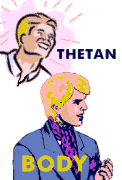Home Search Level 0 Level 1 Level 2 Level 3 Level 4 Level 4Pro Level 5 C/Sing Solo
| Tech terms | Scales | Axioms | Drills | Checksheets | Processes | Prep. lists | C/S terms | C/S tool | Grades | Cramm | Points | KTW | Online |
|
Home Search Level 0 Level 1 Level 2 Level 3 Level 4 Level 4Pro Level 5 C/Sing Solo |
|
|
| Tech terms | Scales | Axioms | Drills | Checksheets | Processes | Prep. lists | C/S terms | C/S tool | Grades | Cramm | Points | KTW | Online | |
Auditors Rights
(C/S Series No 1)

An auditor has a series of responsibilities and rights that are part of every session.
The auditor will usually work under a Case Supervisor or C/S. The case supervisor is a highly trained technical person that oversees the auditing by reading the auditor's reports and by giving him directions for the next session. The C/S is in charge of the auditor's technical performance and the quality of his auditing. The C/S will first of all write up an overall plan, a so-called program, that is a step by step plan for the pc's progress. The most basic program is the Grades. He will follow the progress of the case by reading the auditor's reports of each completed session and direct the auditor's next step. Ideally it will just be the next step of the program. The C/S is responsible for the quality of the auditing and can order the auditor to do extra study or drilling before allowing him to do the next step.
The case supervisor's instructions for the session is usually called a C/S. Note that C/S can mean the person overseeing the auditing and the written instructions for the next session as well.
Regardless of the auditor receiving these written instructions, there are a number of rights and responsibilities, the auditor has, that are 'understood'.
Accepting the PC
The auditor has the right to accept, or not accept, a
certain pc.
If the auditor does not believe he can do a good job with a certain pc he has a right to refuse to audit that pc. He must state specifically why.
"I do not wish to audit this pc because_________. I am willing to audit other pc's." Is an allowed statement from the auditor.
In an organization an auditor may be required to do a certain amount of hours of auditing per week. His seniors should simply give him other pc's to audit. This rule may not be used to avoid 'difficult pc's'.
But It is not ideal to let an auditor audit pc's that he has a dislike for or maybe too close a relationship with for him to be able to stay in control of the session.
Accepting the C/S Instructions
If the auditor gets a C/S instruction to do, that he
thinks is incorrect for the situation, he has a right to reject that C/S. He
should send it back to his case supervisor with his reasons and state a
suggested C/S.
He does not have the right to change the C/S without written OK or decide to do something else during the session. If he has NO Case Supervisor at all the auditor still audits from a C/S. He writes the C/S before session and sticks to it in session.
To change the C/S instructions or actions during the session is called 'C/Sing in the Chair'. This is clearly forbidden as it leads to Q and A. The reason you have a program and a C/S for the session is, so you follow a clear plan that is worked out in advance.
There are certain actions an auditor can do without specific instructions. They are covered below. These are handlings of a list of routine problems and situations, that should be handled on the spot.
Stale Dated Instructions
A C/S that is a week or more old and a program
that is a month or more old is risky. They are too old to be valid. The pc's
situation can have changed in the meantime. Maybe his girlfriend left him, he
got fired, had an accident or whatever. The pc should be given a short metered
interview and an updated C/S should be written up taking this interview into
account.
Such an interview does not require C/S OK. It should be done by somebody else than the auditor. (It's called a Director of Processing Interview - D of P Interview - as it would be done by the Director of Processing in a larger office).
The interviewer would simply have a few prepared questions, that he asks the pc and notes the answers to and any reads on the Meter. It would cover pc's daily life, ask to his past auditing and the like.
Example: Pc has been off auditing for two weeks due to his job. Now he is back. The interviewer could ask:
1. How are you doing?
2. How is your job going?
3. How is your marriage going?
4. Any problems or situations in life?
5. How was your past auditing?
(any problems? Any wins?)
6. Anything the C/S needs to know?
7. Anything you want to say to C/S or me?
The questions are prepared in advance, but the
interviewer can dig to get all the info; the interview
should get enough DATA. It is different from processing because you want
information with Meter reads, not cognitions or EP's. Whatever comes up will
then be handled in auditing.
It is not auditing. It is started with the R-factor: "I am not auditing
you". But the D of P would not evaluate for or invalidate pc, but
simply ask enough questions and get all needed information. The interview is sent to the C/S who now can write a
fresh C/S for the pc.
(See also example under Life Repair
and "Know before You Go" in C/S Mini Hat).
Ending a Session
A C/S can prove unworkable during a session. If
that is the case the auditor should simply end off. He would write up his
report and send the folder to the C/S. Ending the session is the auditor's responsibility and
call.
If he isn't completing an action that was running well it is of course a flunk. If the case was in trouble and it could have been fixed with the handlings below it is also a flunk. But if the C/S instruction isn't working, the auditor has no business in trying to run it - nor to try to run another major process (C/Sing in the chair).
Auditing over Out Rudiments
A pc, to run well, has to have his 'Rudiments In'.
It is a major auditing error to audit a pc on something else if his ruds are
out. Even if his C/S doesn't state "Fly a rud" or
"Fly ruds" he has no business in auditing pc's over out rudiments.
The auditor can do one of two things: He can fly all the ruds if there is no F/N VGI at session start; if he is not trained in flying the ruds, he can return the folder to C/S and request somebody else to do the action.
The auditor does not need specific C/S instructions to ensure the rudiments are in.
Ruds Won't Fly
If the auditor can't get any rud to F/N VGI, he
is justified in doing a Green Form on the pc (if trained on it). A Green Form is a specifically prepared list, that is
designed to handle out rudiment situations with more detailed and specific
questions. It is not designed to handle a high or low TA - it is part of CT-3. If the auditor is trained in how to do a Green Form (GF) it
is an expected action that he uses it here.
Of course, the auditor in flying ruds will use the 'buttons' 'Suppressed', 'Invalidated' and 'False' when he checks for read before resorting to anything else.
Sessions Far Apart
If a pc has not had a session for some time, like
days apart, the rudiments must be flown. Common practice in such a case would be
to take each rudiment questions to an F/N VGI. What is needed is up to the C/S,
however.
It is more optimum to schedule a pc's sessions closer together. Giving sessions far apart may just barely keep up with things happening in pc's life. Auditing is not primarily designed to just do patch up. You should schedule the pc in blocks of intensive auditing to get him through Grades and ahead of life's annoyances.
Unreading Items and Terminals
The C/S may tell the auditor to run a certain
terminal or item. Before doing that, the auditor has to ensure it is charged,
meaning it reads on the Meter.
If it doesn't read the auditor first puts in the 'Buttons'.
Example: If the item is 'a
cat' auditor would check on Meter:
"A cat?" (X)
no read
"On 'a cat', has anything been suppressed?" (X) no read.
"On 'a cat', has anything been invalidated?" (F) read.
That means the item 'a cat' is charged as well and it
should be run.
If the auditor gets no read on the item, even when using buttons, it is an unreading item and should NOT be run, regardless of what the C/S says.
List Questions
Listing processes are taught on CT-3. When an auditor (trained in this) is told
by his C/S to list a question, like "Who or What_______?" or any
listing question and finds the question does not read MUST NOT list it. (The
auditor is expected to use the buttons as above in checking it).
It is an understood part of the C/S instructions, that such question has to be checked for read first and give a valid read (not just a tick or stop) in order to go ahead and do the listing.
If trouble should arise while doing this action, the auditor should have the correction list handy. The correction list for Listing and Nulling is called L4B. It is used by a CT-3 auditor to sort out any difficulties on this action.
It is expected, that the auditor does this correction right away and without need for additional instructions. 'Out List' can be hard on pc's and repairs shouldn't wait.
High TA at Start
If the auditor sees a high TA at session start
(usually TA= 3.5 or above) he should not attempt to fly a rudiment. There are
other causes than rudiments for high TA. Most of the data you have at this level
(CT-0) is contained in the section about False TA.

One major reason for high TA, besides false TA, is 'Out-Int'. It usually comes about after the pc exteriorized during earlier auditing, but now has a specific type of charge in restimulation as a result of this experience.
There is a special Rundown for handling this (Int Rundown, CT-4pro). There is also a correction list called C/S Series 53, High-Low TA Assessment, that is designed to handle this. At this level the C/S will have to determine what to do. At Level 0 the auditor would quickly check obvious reasons for false TA. If that doesn't handle, he would return the folder to C/S.
Going on Hoping
If a case isn't running well or running badly it
is not enough to 'go on hoping'. The C/S needs real data. He can get data from the
pc
Information Sheet, he can get data from metered interviews, from having lists
(like GF) assessed and marked for reads. He can even ask pc's mother. Somewhere there will be a big clue to what to do. It can
be an error in the previous auditing or it can be something in pc's life that
needs to be handled or addressed. Get the data and find the bug. There will be a remedy for
it when the correct thing is found.
Folder Summary
The pc folder should have a Folder Summary inside the
front cover and it must be kept up to date. This gives a full record of what has been run and when.
With this record messed up, there have been examples where the same action was
run twice, etc. When a new process is ordered it is the responsibility of
the auditor to make sure it hasn't been done before. Good folder admin leads to
good programs and sure results. The pc will notice.
Don't Copy
You don't copy lists or worksheets or make them from
notes. Keep the reports as neat as possible, but keep the original ones. Copying
makes errors creep in.
Rudiments Going Out
The rudiments can go out during the session. The auditor
needs to be able to recognize the following:
Pc Critical = Withhold from auditor.
Pc Antagonistic = some By-passed Charge in session (BPC).
No TA = Problem.
Pc Tired = Failed purpose or lack of sleep.
Pc Sad = ARC Break.
Soaring TA = Overrun (O/R) or Protest
Pc doping off = Bypassed F/N or not enough sleep.
No interest = Out Ruds or no interest in the first place.
When the auditor sees any of these manifestations in his pc he should simply handle it right away.
Pc Critical = W/H = Pull the W/H.
Pc Antagonistic = BPC = Use the proper list (like L1C) to handle.
No TA action (or case gain) = Problem = locate and handle the problem.
Tired = no sleep or failed purpose = check for sleep, if OK, check "Do you have a failed Purpose?" and take it E/S (Earlier Similar) to F/N VGI. If pc has not had enough sleep you shouldn't audit him (against Auditors Code).
PC Sad = ARC Break = Locate and handle as an ARC break rud.
Rising or soaring TA = O/R or protest = find out which and handle. Protest is handled by Itsa E/S Itsa to F/N.
O/R is handled with rehab procedure.
Dope Off = lack of sleep or bypassed F/N = check on sleep, or rehab the F/N (rehab procedure).
No Interest = no interest in the first place or out rudiments = recheck for interest (some processes are checked for 'pc interest' before you are allowed to run them). Or check for out-rudiments.
Listing Question goes wrong = BPC = handle with L4B (the correction list for 'Out lists') at once.
Rudiments won't fly = some other error = assess the Green Form (GF) and handle (Class 3 action).
The auditor observing any of the above handles it right away. These are all rudiment types of situations and the rudiments have to be in before the auditor engages in or continues with a Major Action.
If the C/S ordered a handling of one of the above points and for some unknown reason it didn't handle the situation, he can order an interview of pc for data (two way communication for data) to find out what is wrong.
Case Not Handled
If a pc states to the auditor or the Examiner that he
feels his case hasn't been handled, the C/S should find out exactly what is
going on. The C/S can order an interview or two way communication on "What
hasn't been handled". The auditor wouldn't do this kind of action without
the C/S's OK.
Major Actions
An auditor should never begin a Major Action on a pc not
set up for it.
is defined as any action designed to change a case or general considerations or handle continual illness or improve ability. This means a Process or even a series of processes like 4 flows. It doesn't mean a whole Grade or Rundown. It is any process the case hasn't had.A Major Action
As an auditor routinely starts new Major Actions during a session it is vital for the auditor to understand and follows this rule. If he starts a Major Action without the case having been set up for it it can become a tangle. Here are some relevant definitions:
patching up past auditing or recent life errors. This is done by prepared lists or completing an action or correcting lists or even 2-way comm or Prep-checks on auditors, sessions, etc.Repair:
Rudiments: setting the case up for the session action. This includes ARC Brks, PTPs, W/Hs, GF or O/R listing or any prepared list (such as L1C, etc).
Set up: getting an F/N showing and VGIs before starting any Major Action. It means just that - an F/N and VGIs before starting any Major Action. Such may require a repair action and rudiments as well.
Major Action: any action designed to change a case or general considerations or handle continual illness or improve ability. This means a Process or even a series of processes like 4 flows. It doesn't mean a Grade. It is any process the case hasn't had.
Grade: a series of processes culminating in an exact ability attained, examined and attested to by the pc.
Program: any series of actions designed by a C/S to bring about definite results in a pc. A program usually includes several sessions.
The most common auditing errors are the C/S and auditor trying to use a Major
Action to repair a case.
The auditor has to reject a C/S, which tries to use Major Actions to repair a
case with. The case need repair, set-up and rudiments per above definitions, not
a Major Action.
When a pc gets processing for the very first time he is
surely not F/N VGI. The right thing to do is set up actions. Simple rudiments,
rudiments on life; O/R lists on life, etc. These are repair actions. The pc will
sooner or later get F/N VGI's for real. Now you can start on Major Actions.
 |
An Auditing Program is the plan |
Program Violations
An auditor, who gets a C/S that violates the pc's program should reject it.
If a pc isn't running well he should be given a repair, not a new Major Action.
Also, you have to complete one Major Action before you start another one. That is
an important, basic rule in C/Sing and programming.
Grade Violation
A pc, who is on a Grade, should finish that whole
Grade before doing any other program.
Ability Attained
Sometimes, when the pc is being run on a Rundown
or a Grade, the pc will obtain the ability called for or the end phenomena of the
whole action before all the steps are done.
This can happen on Int Rundown, etc. - and also on Grades. If the pc has a huge cognition directly on subject and is VVGI's keep your eyes and ears on alert. It would for starters be a big win and EP for the session. You have to realize, if pc seems to not really run the action or Grade after that, that maybe you hit the full ability regained EP there.
Unnecessary
Repairs
If you are given a C/S to repair a pc who is running
well, you should reject it. A program that is running well should not be interfered
with but simply be completed.

False Reports
Auditors writing a false session report to look good is
committing a serious offense. The C/S depends upon an honest report to be able
to order the right thing. A false report can cover up a real error and get pc
and everybody else into trouble.
Out Ruds on Pc's
An auditor, that are critical of pc's
has Withholds from
the pc and needs to have them pulled. An auditor feeling sad in auditing has an ARC break. If the auditor is worried in session he has a problem. Sometimes auditors need their ruds handled about the
tools and terminals of the trade, pc's, C/Ses, etc.
Auditors and Case
The general rule is however: auditors don't have cases.
When in session enough mental toughness to pull it off is required. Get yourself handled later on.
What Auditor Did Wrong
If the auditor did a session that went wrong, he has a
right to know exactly what he did wrong. The C/S should analyze the session and write up exactly
what technical points the auditor violated. The C/S should write the auditor a
study order (cramming order) and send the auditor to study (course or cramming
section) so he can improve on his skills and data in that exact area.
|
Home Search Level 0 Level 1 Level 2 Level 3 Level 4 Level 4Pro Level 5 C/Sing Solo |
|
|
| Tech terms | Scales | Axioms | Drills | Checksheets | Processes | Prep. lists | C/S terms | C/S tool | Grades | Cramm | Points | KTW | Online | |